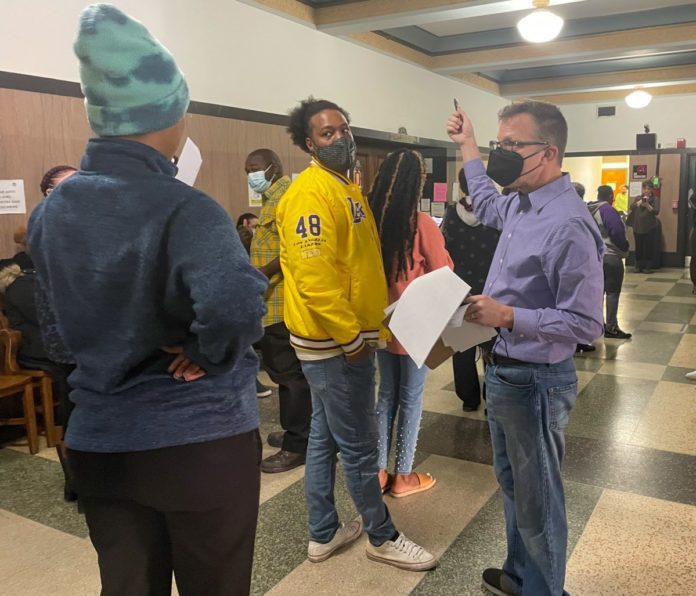
Last Updated on March 3, 2022, 1:42 PM | Published: March 3, 2022
OKLAHOMA CITY (Free Press) — Timia Richardson sat alone in a wooden chair on the sixth floor of Oklahoma County Courthouse as the hall started to fill with people arriving for their eviction cases.
Richardson, her husband and their seven-month old daughter were going to be evicted from their apartment in northwestern Oklahoma City in January, so they applied for rental assistance.
“I ended up borrowing some money just so we could pay it so we didn’t get kicked out,” Richardson said. “It was money we really didn’t have, so now it’s like trying to get that money back to pay people back and then going into another month of that cycle. (We are) just getting pushed behind and it’s all just really a time sensitive thing. So many people are applying for this rental assistance that it’s just backing up time.”
Since Dec, 2020, the state of Oklahoma received $485 million in federal emergency funds to help those at risk of eviction or having their utilities cut off, according to the U.S. Treasury.
Yet thousands of Oklahomans have been evicted.
The latest
Of the 60,727 evictions filed since the start of the pandemic, 22,824 have been carried out, according to Open Justice Oklahoma eviction tracker, a program from the Oklahoma Policy Institute — 6,934 of those have happened since August when the federal eviction moratorium ended.
The state and governments in Cleveland and Oklahoma counties allocated $408.9 million to Community Cares Partners, a program of the Communities Foundation of Oklahoma non-profit, to provide emergency rental and utility assistance to Oklahomans during the pandemic.
The organization has distributed $174.6 million to those in need.
It was mid-February and Richardson was still waiting on a check from Community Cares Partners despite being approved for assistance in January. Her family received another eviction notice, so she was hoping to speak with a representative from the organization outside the courtroom that day since a representative is usually in the hall meeting with tenants.
“We knew we were gonna get the money and they even told us how much — it’s just literally waiting,” Richardson said. “That’s what the stressful thing is. You don’t know when it’s coming, you don’t know how long it’s gonna take. You just know there’s this check out there that’s supposed to come to you.”

Long wait times

Shannon Carr, the director of communications for Community Cares Partners, said she knows there are a lot of frustrated applicants.
“We are an emergency rental assistance program — everyone who has applied and who is waiting for us to work on their application, they are all in an emergency situation,” Carr said. “There’s just so many Oklahomans that need assistance.”
In September, Community Cares Partners closed applications to catch up on a backlog of more than 13,000 applications. When applications reopened on Oct. 15, more than 2,000 were filed within the first 24 hours. Now with a backlog of more than 20,000, applicants are asked to allow the organization 10-12 weeks to review their requests.
Restore Hope Ministries, a faith-based non-profit that serves a 20-county region in the northeastern Oklahoma, closed its applications on Jan. 30 to allow time to process the backlog. Executive director Jeff Jaynes said 5,000 to 10,000 applications await review. That includes some duplicates and people requesting further assistance.

“If you’re gonna push pause on new applications, February is a good time to do that because evictions plummet in the month of February, usually,” Jaynes said. “A lot of that’s because of people getting their tax refunds back.”
The organization also helps provide groceries for people experiencing food insecurity. Jaynes said the non-profit usually has less requests for food assistance in February as well because of tax season.
“People use their tax refunds for those basic needs,” Jaynes said. “So those were a couple of the big reasons why we suspended when we did, just to get through the backlog and to do it at a time when people might have other avenues for assistance.”
Speeding up the process
Some people are evicted before their application can even be processed. Landlords also have the legal right to refuse money from these programs.
“When we had the moratorium in place, landlords didn’t have any choice but to accept the rent assistance because the tenant was going to get to stay,” Eric Hallett, the coordinator of housing advocacy for Legal Aid Services of Oklahoma, said. “As soon as the moratorium ended, they no longer had that incentive to have to have the rent assistance.”

Landlords give up some power and control in their relationship with their tenant when they sign a contract with the rental assistance programs, he said.
“A lot of these contracts require that they allow the tenant to stay for an additional three months and they get paid for that three months up front,” Hallett said. “They have a no eviction clause in there during that three months, so a lot of landlords aren’t happy about that.”
Community Cares Partners and Restore Hope have made changes to speed up the application process.
When the program launched, communication was done almost strictly through email. Now Community Cares Partners has partnered with more than 30 housing stability programs across the state to help people apply for rental assistance and receive additional services. Through these programs, people can get in person help with their applications. The organization has also set up a phone hotline.
If someone is evicted before their application is approved, Community Cares Partners will help with relocation and pay the back rent along with up to three months of rent in advance.
Restore Hope has launched an online chat feature on its website and partnered with a number of housing solutions programs where people can get help in person. Most recently, the non-profit has partnered with Tulsa Responds, which serves as the primary call center where tenants can talk with representatives in English and Spanish. Tulsa Responds also helps with applying for food stamps, enrolling in Medicaid, getting reduced cost or free Internet services, and filing taxes.
Restore Hope also services to rehome those evicted before their applications are approved.
“We (recently) had somebody who was scheduled for a lockout in the midst of the snow,” Jaynes said. “The first response from the landlord was, ‘Nope, we’re not gonna take any money.’”
The organization was able to convince the landlord to work with them and keep the tenant housed and off the streets, he said.
“We’ve built a relationship with landlords over time,” Jaynes said. “We’ve been doing assistance for 25 years, so we’ve been able to build that relationship (with landlords). A lot of times we’re able to either help that tenant move back into the place that they were or to prevent the eviction in the first place.”
The impact of one setback
Despite the backlog, Community Cares Partners continues to accept applications. Restore Hope’s applications will remain paused with no announcement of when they will reopen.
Richardson received her check in the mail the Saturday after she went to the courthouse. Her family’s rent was paid for the months of February and March. She’s now looking for work-from-home jobs so she can help bring in some extra income while also being able to stay home with her daughter.
“It was nerve-wracking because I didn’t know when the money was going to come. If it would have taken any longer, we would have gotten evicted,” Richardson said. “We’re just saving up our money now to prepare for months to come.”
A lot of people in Oklahoma are just one case of the flu away from missing a rent payment, Hallett said.
“Most people in housing court are there because they had a one-time financial setback, so we need a better system in place to make sure that rent assistance and legal assistance is available to those tenants, otherwise they become homeless,” he said. “Then we are all paying more to help that family.”
First published in Oklahoma Watch on March 3, 2022, and published here under Creative Commons license. Free Press publishes this report as a collaborative effort to provide the best coverage of state issues that affect our readers.
Rebecca Najera is a Report for America corps member. She graduated with a master’s degree in journalism from the University of North Texas in 2021. Reach her at [email protected] or (903) 808-0314. Follow her on Twitter @RebeccaNajera42.










